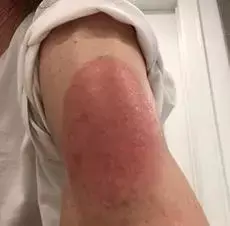- Home
- Medical news & Guidelines
- Anesthesiology
- Cardiology and CTVS
- Critical Care
- Dentistry
- Dermatology
- Diabetes and Endocrinology
- ENT
- Gastroenterology
- Medicine
- Nephrology
- Neurology
- Obstretics-Gynaecology
- Oncology
- Ophthalmology
- Orthopaedics
- Pediatrics-Neonatology
- Psychiatry
- Pulmonology
- Radiology
- Surgery
- Urology
- Laboratory Medicine
- Diet
- Nursing
- Paramedical
- Physiotherapy
- Health news
- Fact Check
- Bone Health Fact Check
- Brain Health Fact Check
- Cancer Related Fact Check
- Child Care Fact Check
- Dental and oral health fact check
- Diabetes and metabolic health fact check
- Diet and Nutrition Fact Check
- Eye and ENT Care Fact Check
- Fitness fact check
- Gut health fact check
- Heart health fact check
- Kidney health fact check
- Medical education fact check
- Men's health fact check
- Respiratory fact check
- Skin and hair care fact check
- Vaccine and Immunization fact check
- Women's health fact check
- AYUSH
- State News
- Andaman and Nicobar Islands
- Andhra Pradesh
- Arunachal Pradesh
- Assam
- Bihar
- Chandigarh
- Chattisgarh
- Dadra and Nagar Haveli
- Daman and Diu
- Delhi
- Goa
- Gujarat
- Haryana
- Himachal Pradesh
- Jammu & Kashmir
- Jharkhand
- Karnataka
- Kerala
- Ladakh
- Lakshadweep
- Madhya Pradesh
- Maharashtra
- Manipur
- Meghalaya
- Mizoram
- Nagaland
- Odisha
- Puducherry
- Punjab
- Rajasthan
- Sikkim
- Tamil Nadu
- Telangana
- Tripura
- Uttar Pradesh
- Uttrakhand
- West Bengal
- Medical Education
- Industry
Delayed skin reactions to Moderna COVID-19 vaccine reported in NEJM

CAPTION
In correspondence published in The New England Journal of Medicine, researchers from Massachusetts General Hospital note that Phase 3 clinical data from the Moderna vaccine trial did show delayed skin hypersensitivity in a small number of the more than 30,000 trial participants. However, the authors say the large, red, sometimes raised, itchy or painful skin reactions were never fully characterized or explained, and they warn clinicians may not be prepared to recognize them and guide patients on treatment options and completion of the second dose of the vaccine.
CREDIT
Massachusetts General Hospital
Boston - Researchers at Massachusetts General Hospital (MGH) have called for greater awareness and communication around a delayed injection-site reaction that can occur in some patients who have received the Moderna mRNA-1273 vaccine as the speed and scale of vaccinations against the SARS-CoV-2 virus ramps up globally.
A series of delayed cutaneous reactions in 12 patients after receiving the Moderna mRNA vaccine has been conveyed in a letter to the editor published online in The New England Journal of Medicine (NEJM) by the authors.
The authors note Phase 3 clinical data from the Moderna vaccine trial did show delayed skin hypersensitivity in a small number of the more than 30,000 trial participants. However, the authors say the large, red, sometimes raised, itchy or painful skin reactions were never fully characterized or explained, and they warn clinicians may not be prepared to recognize them and guide patients on treatment options and completion of the second dose of the vaccine.
"Whether you've experienced a rash at the injection site right away or this delayed skin reaction, neither condition should prevent you from getting the second dose of the vaccine," says Kimberly Blumenthal, MD, MSc, lead author of the letter and co-director of the Clinical Epidemiology Program in the division of Rheumatology, Allergy and Immunology at MGH. "Our immediate goal is to make physicians and other care providers aware of this possible delayed reaction, so they are not alarmed, but instead well-informed and equipped to advise their patients accordingly."
In the letter, Blumenthal and her co-authors also note their own clinical observations of the delayed, large, local reactions to the Moderna vaccine, and report on a series of 12 patients with the reactions. In that group, symptom onset ranged from four days after the first dose up to 11 days post-vaccination, with a median onset of symptoms on day eight. Photographs show the varied size and severity of the reactions. Most patients were treated with ice and antihistamines, although some required corticosteroids and one was erroneously treated with antibiotics.
"Delayed cutaneous hypersensitivity could be confused - by clinicians and patients alike - with a skin infection," says letter co-author Erica Shenoy, MD, PhD, associate chief of the MGH Infection Control Unit. "These types of reactions, however, are not infectious and thus should not be treated with antibiotics."
On average, symptoms cleared up after nearly a week for the group of 12 reported in the letter. Half of the patients went on to experience a reaction after the second dose - at or around 48 hours post-vaccination. No patient experienced a dose two reaction that was more severe than their dose one reaction.
The authors also say samples taken from skin biopsies confirmed their suspicion of a delayed allergic immune response that is commonly seen in drug reactions.
"For most people who are experiencing this, we believe it's tied to the body's immune system going to work," says Esther Freeman, MD, PhD, director of Global Health Dermatology at MGH and co-author of the NEJM letter. "Overall, this data is reassuring and should not discourage people from getting the vaccine."
For further reference log on to:
http://dx.doi.org/10.1056/NEJMc2102131
Dr Kamal Kant Kohli-MBBS, DTCD- a chest specialist with more than 30 years of practice and a flair for writing clinical articles, Dr Kamal Kant Kohli joined Medical Dialogues as a Chief Editor of Medical News. Besides writing articles, as an editor, he proofreads and verifies all the medical content published on Medical Dialogues including those coming from journals, studies,medical conferences,guidelines etc. Email: drkohli@medicaldialogues.in. Contact no. 011-43720751


